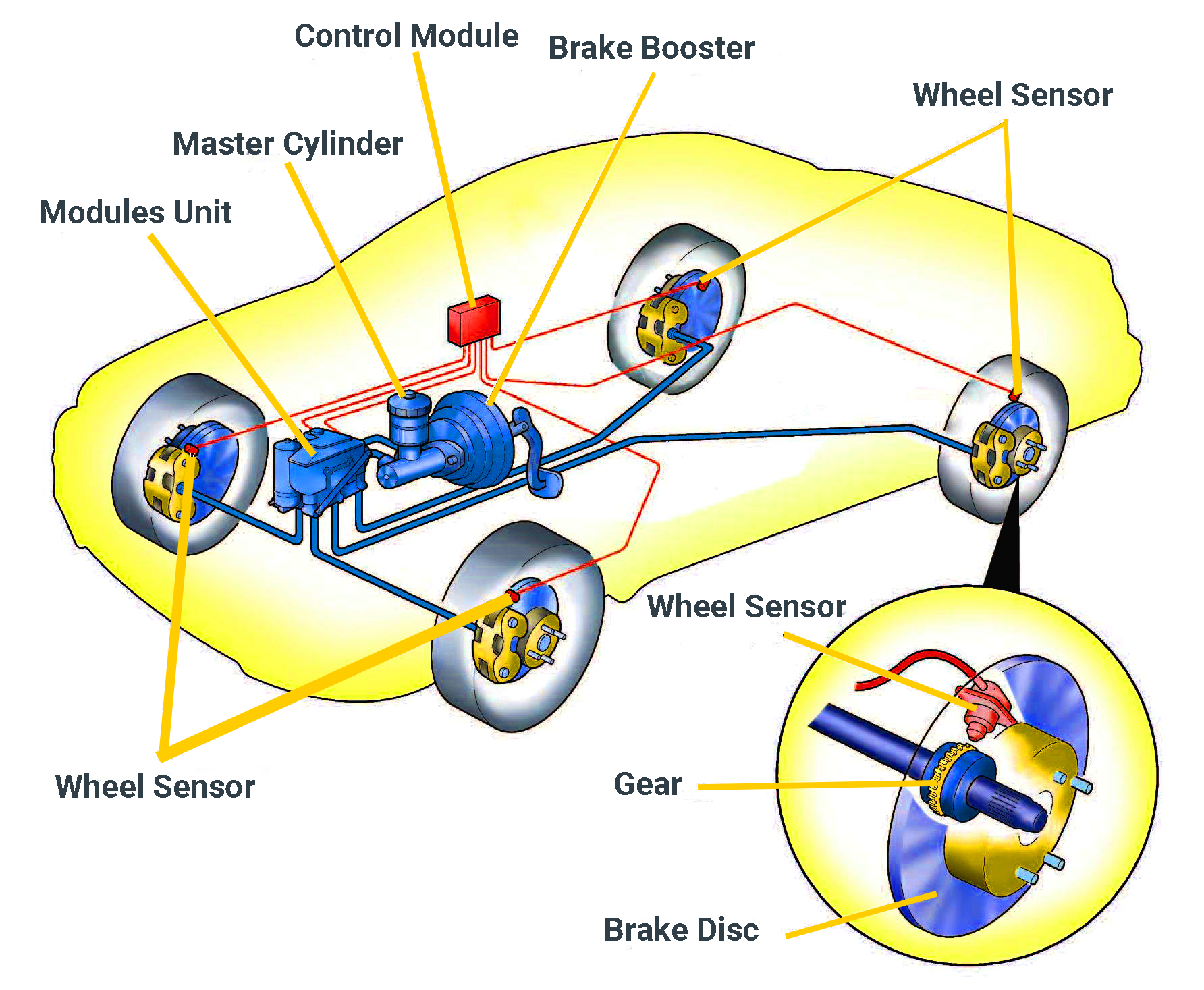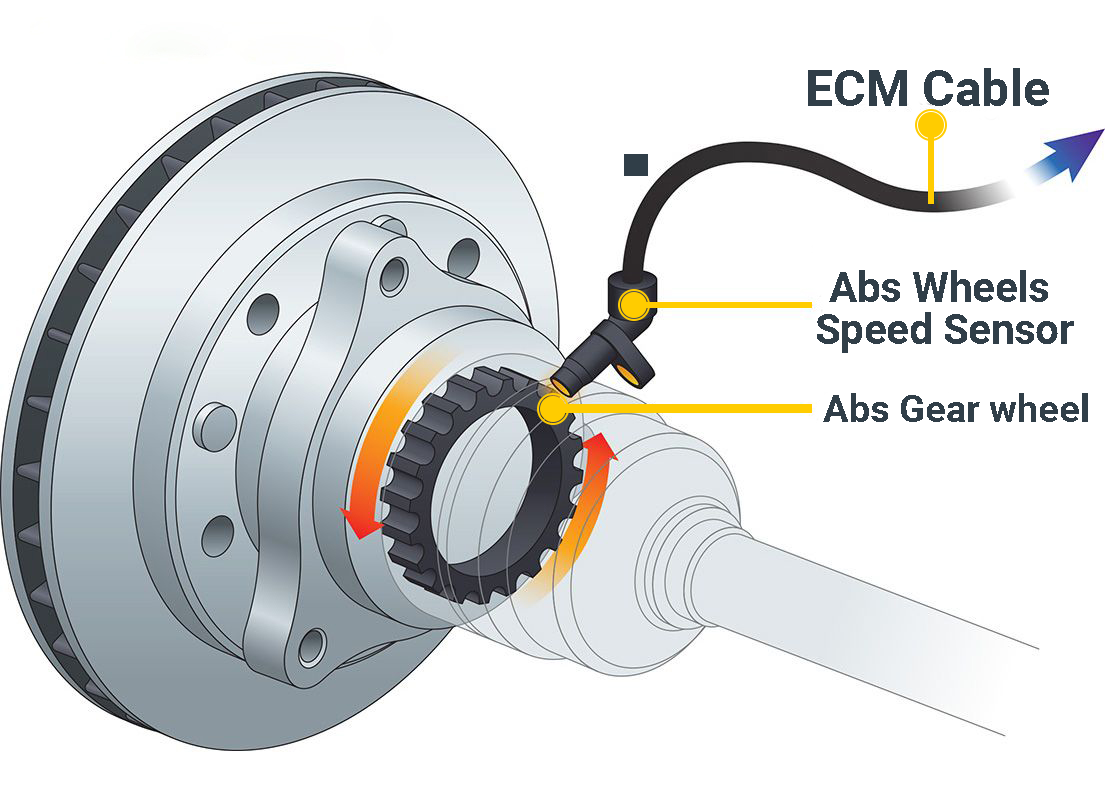What does abs stand for? (What is ABS Brake System?)
Abs means Anti-lock Braking System or anti-slip braking system. (Anti-skid Braking System) Abs braking system is a system that prevents the wheels from slipping and locking during braking. An abs electronic control unit manages the abs braking system. Parts of ABS Brake System is consisting Abs electronic control unit, Hydraulic Control Group (Electric hydraulic pump + Solenoid valve body + Control unit), Hydraulic pipes and hoses, Wheel speed sensors, Brake switch (brake pedal sensor). Pressurized brake hydraulic oil, which is formed when the brake pedal is pressed, is sent to the brake mechanism of each wheel separately by the ABS hydraulic control group. There are 1 oil inlet and 4 oil outlet channels (for 4 wheels) on the solenoid valve body on the abs module. The electric pump adjusts the hydraulic brake pressure (increases, decreases or maintains hydraulic pressure).

The ABS electronic control unit looks at the speed information from the wheel (abs) speed sensors on each wheel of the vehicle. When braking, when a wheel senses that the other wheels are turning slower or not turning (slip), it reduces the amount of hydraulic oil pressure sent to that wheel very precisely and very quickly. Thus, it prevents the wheel from slipping when the brake is pressed.When the brake pedal is fully depressed, it sends braking force to the wheel up to its slip limit.

(Tekerlek hız sensörü - abs sensörü)
For example, the right wheels have entered water or on icy ground; whether the left wheels are on dry or ice-free ground. In this case, the coefficients of friction on the floors of the right and left wheels (tyres) will be different. Icy and wet ground will cause the wheel to slip more easily when the brake is applied. Even in this case, the ABS braking system sends different braking forces to the right and left wheels, preventing tire slippage and loss of steering control.
Abs brake system video-animation narration:
Does Abs Increase Braking Distance?
Yes it extends. ABS braking system does not shorten the braking distance. The advantage of the ABS braking system is to prevent the wheels from locking (slipping) when the brake is pressed and to prevent loss of steering control. To steer a car, its wheels have to turn (not slip), that's what ABS do.
How to Understand if Abs Are Working
When you press the brake pedal hard and try to stop the vehicle suddenly, you will hear a slight vibration in your foot and a "crunch - click" sound, this means the abs are engaged and are adjusting the braking force to prevent the tires from slipping.
Why the ABS to step in early?
Old worn tires are the most important reason for ABS to step in early. If your tire is old, the grip will decrease and the tendency to slip will increase, in which case the abs will step in immediately. If the abs kick in immediately, even at low speed, look for the problem in the tyres. If the ABS kicks in early despite being a new tyre, it means the tire quality is bad, and it is also important that the air in the tire is suitable. Apart from that, abs will be activated early on icy, muddy, wet roads, this is normal.
How to Understand Abs Failure?
When the ABS system fails, the ABS fault lamp will illuminate in the driver's instrument cluster (ABS sign). When the ignition is turned on, the abs light will come on to check if the abs light is working, but should go out after a few seconds. If the ABS warning lamp is constantly on and does not go out, or if it comes on while driving on the road, it means that there is a malfunction in the ABS system, in this case the abs will not be activated, but even if the ABS malfunction light comes on, the brakes will continue to work. You cannot hear the sound and vibration that you only hear when the abs is active.
How to fix ABS Failure?
In order to find out the cause of the ABS fault, you must connect the vehicle to the diagnostic device at the technical service and have the fault memory checked. The causes of ABS failure are usually caused by looseness, breakage or short circuits in cable and socket connections. In case of ABS failure, electrical connections, voltage and resistance must be checked. Apart from that, the most common reason for abs failure is the failure of the ABS module.

